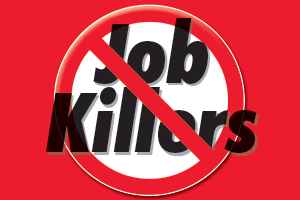CalChamber Job Killer Tag Identifies Worst Proposals
Economic growth and job creation are the keys to making California a great place to live, work and do business. To help lawmakers focus on the full ramifications of proposed laws, the California Chamber of Commerce identifies each year the legislation that will hinder job creation. The job killer list highlights those bills that truly are going to cost the state jobs. The CalChamber policy staff is very judicious about the difference between legislation that merits opposition and a job killer.
The goal is to remind California policymakers to keep their focus on the No. 1 issue affecting their constituents—economic recovery and job creation. Each bill designated as a job killer would increase uncertainty for employers and investors, and lead to higher costs of doing business, which will undermine the economic health of the state. Individually, the job killer bills are bad, but cumulatively they are worse.
Jobs are killed when employers lay off workers or can’t afford to hire workers to provide goods and services to consumers. Workers are laid off (or wages are reduced) if consumers do not buy goods and services from businesses, or because the cost of providing those goods or services has increased to the point where the business is not competitive. Consumers will not buy goods and services if they have less money to spend, or if the goods and services are a lesser value (higher cost/lesser quality) than alternatives in the marketplace. Lower wages and fewer jobs are the result of an employer not being successful in the marketplace—when an employer is not competitive and/or consumers have no money to spend.
Government kills jobs when it passes laws, rules and regulations that discourage investment and production, that add unnecessary cost and burdens to goods and services, or that make California employers uncompetitive.
Job killer bills make employers less competitive, forcing them to reduce employee benefits, or take resources from consumers.
Criteria
Factors that have earned job killer status for legislation include:
• imposing costly workplace mandates;
• creating barriers to economic development/economic recovery;
• requiring expensive, unnecessary regulations;
• inflating liability costs;
• imposing burdensome or unnecessary requirements that increase costs on businesses;
• expanding government at businesses’ expensive;
• criminalizing inadvertent business errors;
• imposing new or higher fees and taxes;
• discouraging businesses from expanding their workforce in or to California.
Bills Stopped
Since starting the job killer bill list in 1997, the CalChamber has prevented 92% of these onerous proposals from becoming law. Every job killer stopped means the state will at least do no more harm to businesses and their ability to compete in the national and global markets.
Updates appear at cajobkillers.com and calchamber.com/jobkillers.
January 2025
Agriculture and Resources
California Environmental Quality Act (CEQA)
Climate Change
Education
Energy
Environmental Regulation
Health Care
Housing and Land Use
Immigration Reform
International Trade
Labor and Employment
Legal Reform
Managing Employees
Privacy
Product Regulation
Taxation/Budget
Tourism
Transportation
Unemployment Insurance/Insurance
Water
Workers’ Compensation
Workplace Safety


